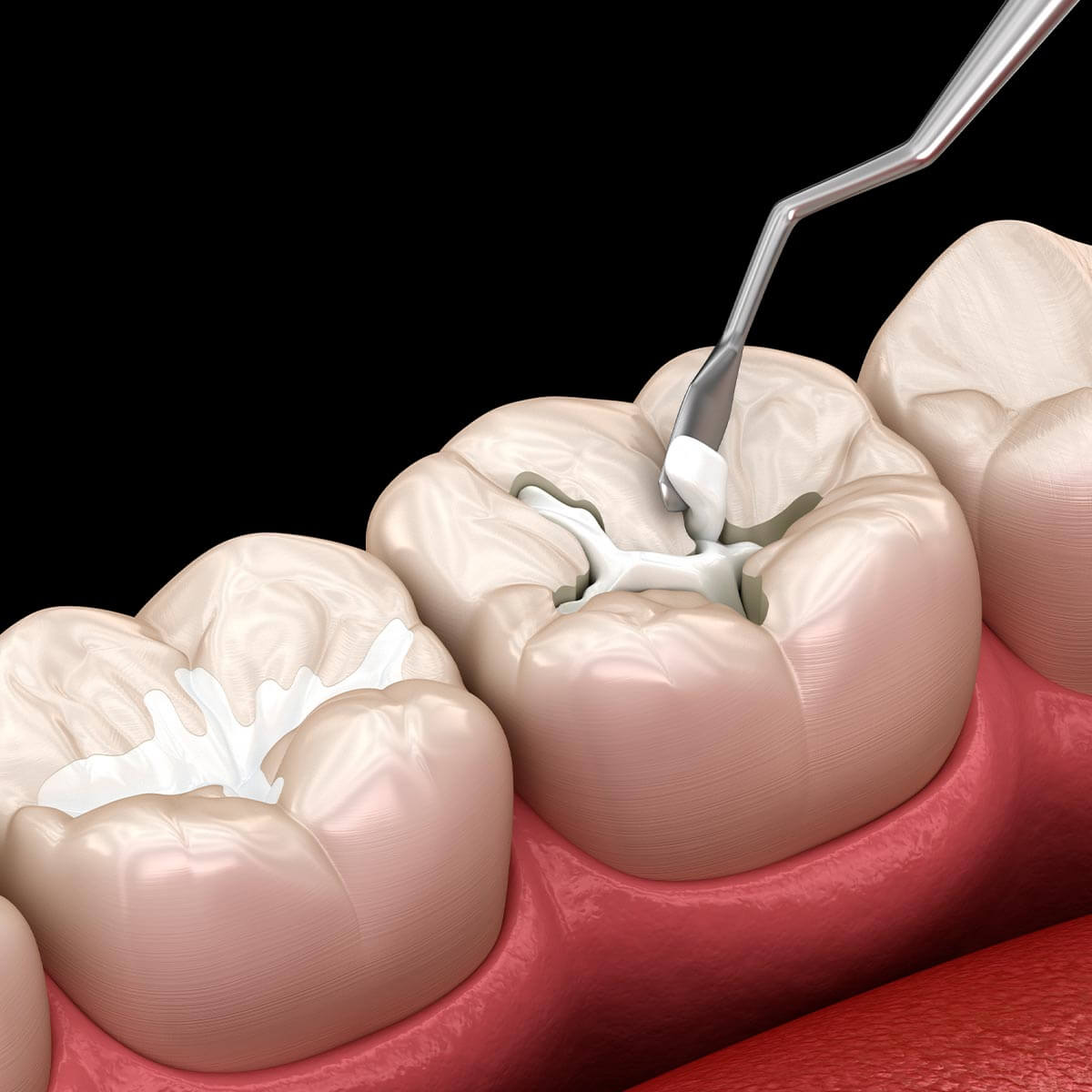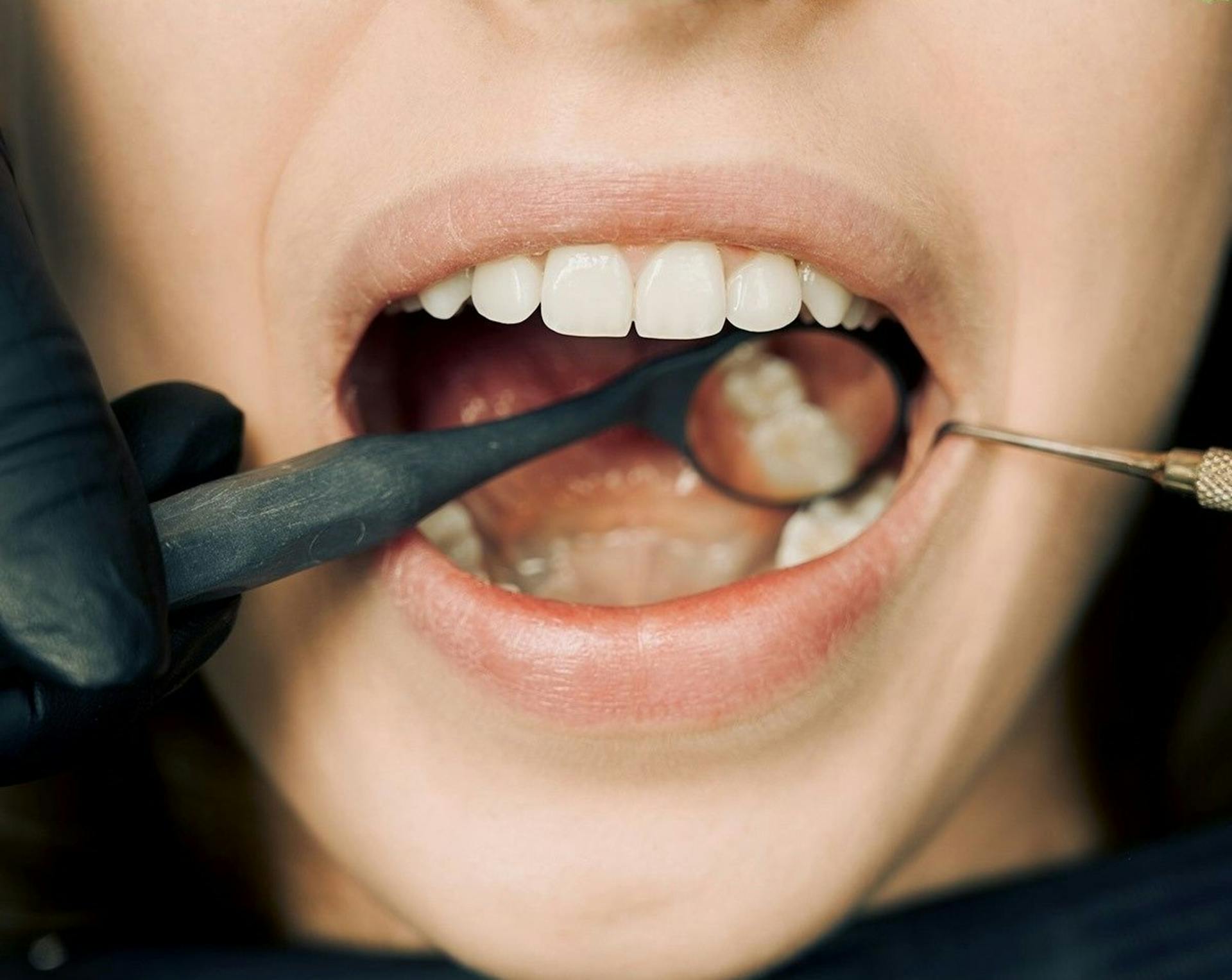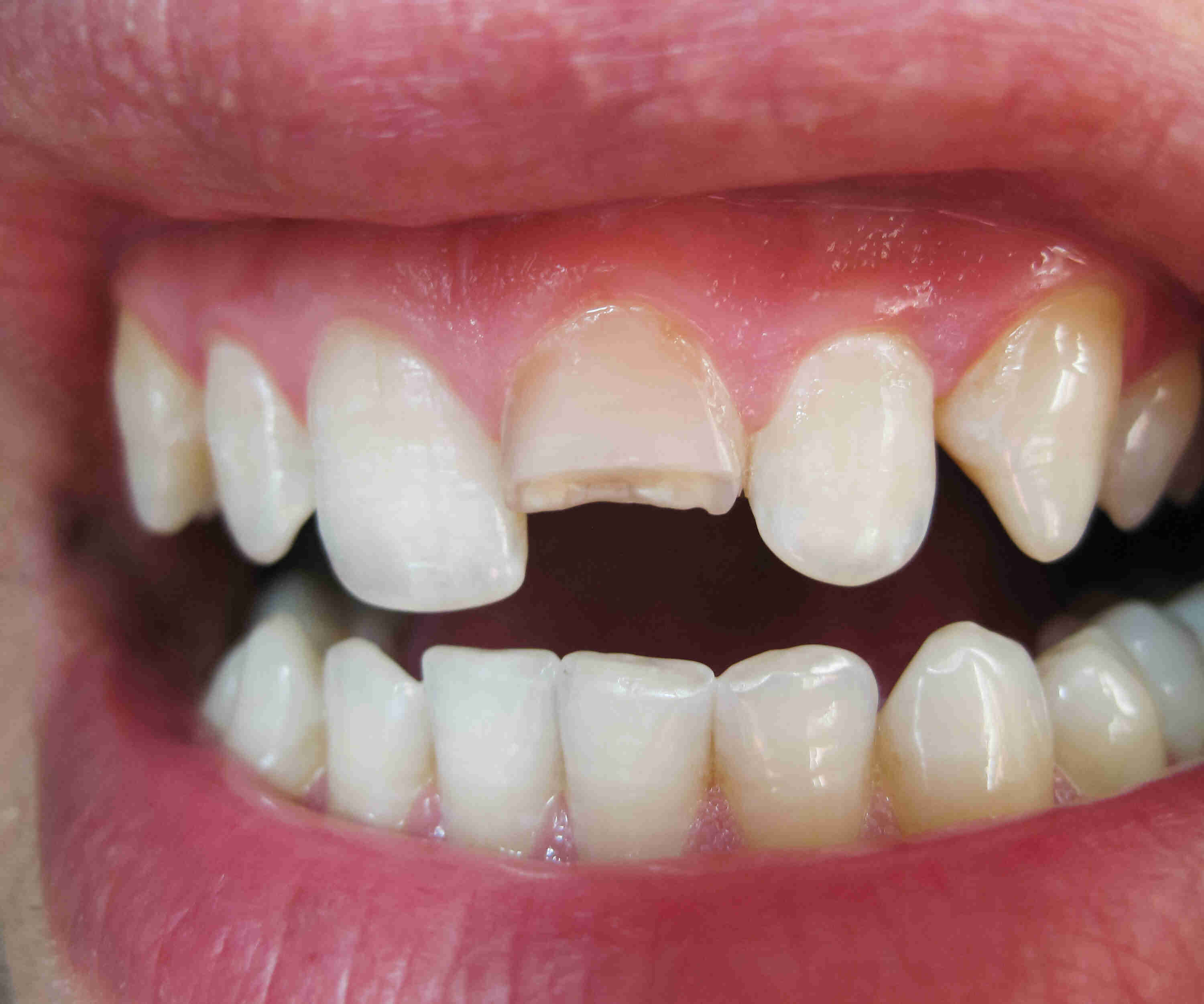.svg)
.svg)
.svg)
.svg)

What are Tooth Fillings?
Tooth fillings, also known as dental fillings or dental restorations, are artificial materials used to restore tooth structure and support function where clinically appropriate. By the time they start primary school, it's estimated that more than 50% of all children in Singapore have one or more rotten teeth. This troubling statistic highlights the urgent need for preventive dental care and effective treatment options for our young ones. In this article, we explore the benefits and varieties of tooth fillings available. Don't miss out!
How do Tooth Fillings Work?
Tooth fillings in 2026 play a crucial role in dental restoration by directly addressing cavities and structural damage. The process begins with the dentist cleaning out the decayed material from the tooth help reduce the risk of further decay. Once cleaned, the cavity presents a void that must be filled to restore the tooth's functionality and prevent structural weakening.
The choice of filling material depends largely on the tooth's location, the size of the cavity, and cosmetic considerations. Materials such as composite resins and dental amalgam are skillfully moulded and hardened within the cavity, closely replicating the tooth's original shape. For a seamless integration, the filling is then polished to match the surrounding tooth surface, ensuring both durability and a natural appearance.
This repair not only restores the integrity of the tooth but also prevents the intrusion of bacteria, safeguarding against additional decay. Regular follow-ups ensure the filling remains intact and continues to function as intended, contributing to overall dental health.

Book an Appointment
Fill out the form for any request or questions you have and we will contact you within one working day..
Do I Need a Tooth Filling?

Do I Need a Tooth Filling?
- Visible Decay or Damage: If you notice dark spots, holes, or chips on your teeth, these are common indicators that you might need a filling.
- Tooth Sensitivity: Experiencing discomfort or pain when consuming hot, cold, or sweet foods can signal decay that might require a filling.
- Food Getting Stuck: Frequent food trapping in specific teeth areas could suggest decay or a gap that a filling could repair.
- Previous Filling Issues: If an old filling breaks or falls out, replacing it promptly is essential to prevent further tooth damage.
- Dental Check-Up Results: Regular dental examinations can uncover hidden decay that isn't immediately noticeable or painful, leading to early intervention with a filling.
Direct vs Indirect Tooth Fillings
Direct Fillings (Traditional Fillings)
These are commonly used options based on clinical assessment of restoring a tooth’s function and appearance. A dentist applies a malleable filling material, such as composite resin, directly into the tooth cavity during a single visit. This process is ideal for minor tooth repairs, as the material can be shaped to match the natural contours of the tooth, restoring its original shape and function.
Advantages:
- Quick Procedure: Usually completed in a single dental visit.
- Cost-Effective: Generally less expensive than indirect fillings.
- Immediate Relief: Quickly restores tooth function, reducing discomfort.
- Minimal Tooth Preparation: Less of the tooth needs to be altered compared to procedures for indirect fillings.
Disadvantages:
- Less Durable: Composite resins are less durable than materials used in indirect fillings.
- Wear Over Time: More susceptible to wear and tear, especially in areas of heavy biting.
- Colour Matching: May discolour over time or not match the tooth colour perfectly as natural teeth change colour.
Indirect Fillings
Indirect fillings, including inlays, onlays and overlays, offer a durable solution for more extensive tooth decay or damage. Unlike direct fillings, these are fabricated in a dental laboratory based on an impression of the damaged tooth taken during the first visit. The dentist removes decay or an old filling and installs a temporary filling to protect the tooth while the permanent restoration is being made. During the second visit, the dentist checks the fit of the indirect filling and, if satisfactory, permanently cements it into place. This two-step process ensures a precise fit and optimal tooth restoration.
Advantages:
- Superior Durability: Materials used (like porcelain and gold) are more durable and wear-resistant.
- Better Fit: Custom-made to fit precisely, enhancing tooth structure and integrity.
- Aesthetic Quality: Better colour matching with the natural teeth, maintaining a more consistent appearance over time.
- Longevity: Typically last longer than direct fillings, making them a good long-term investment.
Disadvantages:
- Higher Cost: More expensive due to the materials used and the process of fabrication in a dental lab.
- Multiple Visits Required: At least two visits are necessary, which can be inconvenient.
- Temporary Sensitivity: Temporary fillings used between visits can sometimes be less comfortable and less effective at sealing the tooth from bacteria and debris.
Types of Indirect Dental Fillings
Inlays
Dental inlays are fillings that fit into the pits and fissures (grooves) of a tooth’s chewing surface. They are made of a solid material, custom-fit to your tooth, and usually used to fill the space in the center of your tooth that has been damaged by decay or injury.
Lifespan: 10 years
Onlays
Similar to inlays, dental onlays are made of a solid material that is custom-fit to your tooth. An onlay is larger than an inlay but smaller than a dental crown. It is used to fill a larger cavity that extends over the cusps of a tooth.
Lifespan: 10-15 years
Overlays
Overlays, also known as partial crowns, are indirect restorations made from impressions of damaged teeth. Once made, they are cemented to get a more durable solution than dental fillings. It gets fit over the biting surface of your tooth, which is made of a solid piece of porcelain, composite, sometimes resin or gold.
Lifespan: Over 15 years
Types of Indirect Dental Fillings

Amalgam Fillings (Silver Fillings)
Amalgam fillings are made of a mix of metals, including mercury, which makes them very strong. They are often used on back teeth because they last a long time and can handle a lot of chewing, even though they're silver and not tooth-coloured.
Advantages:
- High durability, suitable for molars.
- Cost-effective compared to other filling materials.
- Long lifespan; can last up to 10-15 years or more.
Disadvantages:
- Noticeable due to their dark colour, not aesthetically pleasing.
- Can cause discoloration over time, leading to a greyish hue on the surrounding tooth structure.
- Not suitable for front teeth or where a natural appearance is crucial.
- About 1% of people are allergic to the mercury present in amalgam restorations.
- Potential for cracks and fractures in teeth due to the expansion and contraction properties of the material.
Amalgam Fillings (Silver Fillings)

Composite Resin Fillings (Tooth Coloured Fillings)
Composite resin fillings are made to look just like your natural teeth. They are popular because they blend in and are not noticeable. This type of filling is great for fixing front teeth or any visible parts of your teeth.
Advantages:
- Aesthetically pleasing as they match the natural tooth colour.
- Moderately to highly resistant to wear
- Bonds directly to the tooth surface, providing support.
- Less tooth structure needs to be removed compared with amalgam fillings.
Disadvantages:
- Less durable than amalgam, typically lasting 5-7 years.
- Chipping of teeth may occur.
- More expensive than amalgam fillings.
- Can shrink during the curing process, leading to gaps and leakage.
- Placement may require more than one office visit.
- Not ideal for large fillings in high-pressure areas (where teeth experience significant forces during biting and chewing).
- Can stain over time or due to exposure to tea, coffee, or tobacco.
Composite Resin Fillings (Tooth Coloured Fillings)

Glass Ionomer Fillings
Glass ionomer fillings are special because they can release fluoride, which helps prevent further tooth decay. They are good for filling cavities near the gum line or for children's teeth, as they are gentle on the tooth and don’t need much drilling.
Advantages:
- Release fluoride, which can help protect the tooth from further decay.
- No need for extensive preparation before the tooth filling procedure.
- Biocompatible with tooth tissue.
- Useful for subgingival (below the gum line) fillings and areas not subjected to heavy biting pressure.
Gold fillings are known for their durability and are one of the longest-lasting options. While more expensive, they are extremely tough and work well in areas of the mouth that do a lot of chewing, like the back teeth.
Disadvantages
- Less durable than composite resin and amalgam, suitable only for small fillings.
- Prone to wear and fracturing, not recommended for load-bearing areas like molars (flat teeth at the back of your mouth).
- Aesthetic quality is lacking compared to composite resin.
Glass Ionomer Fillings

Gold Fillings

Gold Fillings
Gold fillings are known for their durability and are one of the longest-lasting options. While more expensive, they are extremely tough and work well in areas of the mouth that do a lot of chewing, like the back teeth.
Advantages:
- May have a longer lifespan compared to some other materials, depending on use and care.
- Highly resistant to corrosion and wear.
- Does not cause wear on opposing teeth.
Disadvantages:
- Placement requires at least two visits.
- Most expensive type of filling.
- Galvanic shock: May occur when gold fillings come into contact with other metal fillings, creating an electrical current that can cause a sharp, sudden pain in the mouth.
- Gold colour is noticeable, which might not be aesthetically pleasing for some.
Porcelain Fillings
Porcelain fillings are very strong and can be made to look just like your natural teeth, making them perfect for teeth that show when you smile. They resist stains and wear down at a rate similar to natural teeth.
Advantages:
- Generally resistant to staining and wear.
- Colour and texture can be customised to match natural teeth.
- Strong and durable, particularly when used in inlays and onlays.
- More expensive than composite and amalgam fillings.
- Can be brittle and prone to cracking under high biting forces.
- Placement requires at least two visits.
- Requires more tooth structure to be removed than for composite fillings.
Ceramic Fillings
Ceramic fillings are made using modern technology called CAD-CAM (Computer Aided Design, Computer Aided Manufacturing) to exactly match the shape and color of your teeth. They are a good choice for fixing front teeth because they look very natural and are quite strong.
Advantages:
- Excellent aesthetic results with a look very similar to natural teeth.
- Long-lasting with proper care.
- Less wear to opposing teeth compared to other harder materials.
Disadvantages:
- High cost, particularly because of the technology involved.
- May be less durable than gold or porcelain if not thick enough.
- Can crack under heavy biting forces.
Teeth Gap Fillings
Teeth gap fillings, also known as dental bonding, are a quick fix to improve the look of your smile by filling in spaces between teeth. This method is simple, fast, and effective, especially for minor cosmetic changes.
Advantages:
- Quick and non-invasive procedure
- Enhances cosmetic appearance and function.
- Usually reversible if no natural tooth enamel is removed.
- Not as durable as other restorative methods; may need to be replaced or repaired.
- Can become discoloured over time without proper care.
- Limited to cosmetic improvements; not suitable for structural damages.
- Not a solution for large gaps that might require orthodontic interventions like braces.
Chipped Tooth Fillings
When fixing a chipped tooth, a dentist uses a tooth-coloured material called composite resin. It's molded to look just like the rest of your tooth, filling in where the chip was. The dentist uses a special light to set the material quickly, and then polishes it to make it look natural. This whole process can often be done in just one visit, making it a fast way to restore the look and function of a tooth that’s been chipped.
Advantages:
- Help restore tooth structure and function.
- Treatment typically completed in a single visit.
- Less invasive, preserving more of the natural tooth structure.
Disadvantages:
- May not be suitable for large fractures that compromise tooth integrity.
- Can wear out or dislodge, requiring future repairs.
- Composite material used may stain over time.
- Not ideal for back teeth with high chewing loads.
Front Tooth Fillings
Front tooth fillings use materials that look just like your natural teeth to fix cavities or chips in the teeth that are most visible when you smile. The filling material is carefully chosen to match the colour of your other teeth so it blends in well. This treatment not only restores the strength of your tooth but also ensures it looks good as new.
Advantages:
- Aesthetic fillings maintain the natural appearance of the tooth.
- Material advancements provide better colour match and durability.
- Can be used for minor cosmetic modifications besides fillings.
Disadvantages:
- Less durable than metal fillings, needing more frequent replacements.
- Higher cost than amalgam fillings.
- May not be as effective in large cavities where structural integrity is a concern
- Not suitable for areas under high chewing pressure.
Wisdom Tooth Fillings
Filling a cavity in a wisdom tooth involves using strong materials, like amalgam, to stop decay and prevent pain. Wisdom teeth, located at the back of your mouth, often need durable fillings because they handle a lot of chewing. Filling these teeth can be a good option instead of removing them, especially if the tooth is healthy enough to be saved and well-positioned in your mouth.
Advantages:
- Effective in preserving the tooth if extraction is not necessary.
- Amalgam used in molars can withstand high chewing forces.
- Cost-effective compared to extraction and replacement.
Disadvantages:
- Risk of complications if the tooth is not fully erupted (becomes visible) or unaccessible (due to overcrowding, unusual position etc.).
- Amalgam fillings may not be preferred due to aesthetic concerns.
Temporary Tooth Fillings (Tooth Cement Fillings)
Temporary tooth fillings use a special dental cement to seal and provide short-term coverage for the tooth. These fillings are a short-term fix, often used while you’re waiting for a permanent filling or crown to be made. They help keep your tooth safe from further damage or decay in the meantime. Dental cement is also used to hold inlays and onlays in place temporarily, ensuring they fit perfectly before a final setting.
Advantages:
- Provides immediate relief and protection until permanent treatment.
- Prevents further decay and contamination of the tooth.
- Easy to apply and remove by a dentist.
Disadvantages:
- Not designed for long-term use; durability is limited and not as aesthetically pleasing as options like composite resin fillings.
- May dislodge if not properly cared for, requiring reapplication.
Temporary Tooth Fillings (Tooth Cement Fillings)

When Are Temporary Tooth Fillings Needed?

When Are Temporary Tooth Fillings Needed?
Temporary tooth fillings are needed in the following situations:
- After a root canal, to protect the tooth until a permanent filling or crown is placed.
- During complex dental procedures that require multiple visits.
- If there's a need to wait for a dental lab to create a permanent crown or filling.
- To allow time for inflammation to decrease or an infection to heal.
- When immediate permanent treatment is not possible due to time constraints or other factors.
Dental Fillings Procedure
Chronic pain in your teeth, bleeding gums, or even a chipped tooth aren't just uncomfortable; it can affect your daily activities or sleep. Severe oral infections have the potential to be life-threatening, and you might need instant treatment.

Before the Procedure
- Personalised Assessment: We'll start by carefully assessing your oral health and considering your medical history to tailor the treatment specifically for you.
- Ensuring a Clean Workspace: We use rubber dam isolation, which involves placing a thin sheet of rubber around your tooth, to keep the area free from saliva. This method ensures the durability of your new filling by maintaining a dry and clean environment during the procedure.
- Choosing the Right Filling for You: The type of filling used is selected based on the extent of decay, the location of your tooth, and your aesthetic preferences.
- Temporary Solutions: If your situation requires, we may apply a temporary filling, especially during complex procedures that need follow-up visits.
During the Procedure
- Comfort is Key: We begin by numbing the area with a local anaesthetic to support patient comfort during the procedure.
- Thorough Care: Your dentist will then remove decay using a drill or laser, followed by thoroughly cleaning the cavity to prepare for the filling. The chosen material, whether amalgam, composite, or another, is then precisely placed and shaped to restore the tooth's original form and function.
- Tailored Treatment: Depending on the complexity, the procedure might require more than one visit to perfect your smile.
Dos and Don'ts After Tooth Filling
Dos:
- Maintain optimal oral hygiene by brushing with fluoride toothpaste and flossing daily.
- Schedule regular dental check-ups, ideally twice a year, to monitor and maintain your fillings.
- Be vigilant and contact your dentist if you experience intense sensitivity or detect a sharp edge on the filling.
- Take immediate action if a filling seems to be failing, feels loose, or if pieces are missing.
Don'ts:
- Ignore the signs of a 'leaking' filling, such as gaps that allow debris and saliva to enter and cause decay. If suspected, consult your dentist who may perform X-rays to check the integrity of the filling.
Tooth Fillings Benefits
- Restoration of Functionality and Appearance: Dental fillings in 2026 restore both the functionality and the appearance of teeth. By filling cavities and rebuilding the tooth structure, they enable normal chewing and biting. Tooth fillings using materials like composite resin and glass ionomer are tooth-coloured, effectively restoring the natural appearance of teeth. These fillings camouflage decay-induced discoloration, making them ideal for maintaining a presentable, healthy-looking smile.
- Prevention of Further Decay: By sealing off spaces where bacteria can enter, fillings prevent further decay.
- Cost Savings: Dental fillings in 2026 can result in long-term cost savings by preventing conditions that require more extensive and expensive treatments.
- Avoidance of More Invasive Procedures: Early intervention with a filling can often prevent the need for more invasive procedures such as root canal therapy or crowns.
At Nuffield Dental, we are committed to maintaining your oral health and preserving your smile with personalised dental care. Don’t hesitate to reach out to us if you have any queries!
Our Team
View MoreAt Nuffield Dental clinic, your dental needs are cared for by our dedicated team of dentists.

OHT Rebecca Siow Hui Lin
Specialisation
General Dentistry
Training
Diploma in Oral Health (NYP)
The Nuffield Dental Clinic Network In Singapore
Seletar Dental
Nuffield Dental Seletar
Greenwich V
1 Seletar Road #01-07/08
Singapore 807011

Kovan Dental
Nuffield Dental Kovan
Simon Plaza
2 Kovan Road #01-03
Singapore 548008

Serangoon Dental
Nuffield Dental Serangoon Gardens
Serangoon Garden Estate
57 Serangoon Garden Way
Singapore 555953

Siglap Dental
Nuffield Dental Siglap
The Domain
914 East Coast Road #01-03
Singapore 459108

Bedok Dental
Nuffield Dental Simpang Bedok
East Village
430 Upper Changi Road #01-64
Singapore 487048

Holland Village Dental
Nuffield Dental Holland Village
7 Holland Village Way #03-16
Singapore 275748

Jurong East Dental
Nuffield Dental Westgate
Westgate
3 Gateway Dr #04-32
Singapore 608532

HarbourFront Dental
Nuffield Dental HarbourFront
HarbourFront Centre
1 Maritime Square #02-64A
Singapore 099253

Orchard Dental
Nuffield Dental Jewel
Wheelock Place
501 Orchard Road #05-01
Singapore 238880

Raffles Place Dental
Nuffield Dental Raffles Place
One Raffles Place
1 Raffles Place #05-19
Singapore 048616


Book an Appointment
Fill out the form for any request or questions you have and we will contact you within one working day..
Am I a Good Candidate For Tooth Fillings?
- Prevention of Further Damage: If you have a decayed tooth or damage from grinding, fillings can help prevent further deterioration.
- Targeted Benefits: Individuals with low plaque levels but high decay risk, particularly in areas between teeth or on chewing surfaces, can greatly benefit from fillings.
- Professional Consultation Recommended: Consulting with a dental practice like Nuffield Dental can provide a comprehensive assessment of your dental health and help you choose the filling best suited to your needs.
What Causes Dental Fillings to Fall Out?
- Wear and Tear: Fillings can wear down from chewing, grinding, or clenching, eventually loosening.
- Decay Under Filling: New decay can undermine the filling’s support, causing it to loosen and fall out.
- Improper Bonding: Fillings may not bond correctly to the surface of the tooth if the cavity wasn't properly cleaned before placement.
- Physical Impact: A direct hit to the mouth can dislodge a filling.
- Temperature Fluctuations: Repeated exposure to hot and cold temperatures can cause the filling material to expand and contract, leading to a loose fit.
How Can I Tell If My Dental Filling Has Fallen Out?
Here are some telltale signs that your dental filling has fallen out:
- You might feel a small, hard object in your mouth after biting something hard.
- Running your tongue over the tooth may reveal a crack or hole.
- Food might get stuck around your tooth.
- You could experience discomfort or sensitivity to temperature changes in foods.
What Should I Do if My Dental Filling Falls Out?
Schedule a dental visit to determine the best course of action. Your dentist will recommend one of these treatments:
- Filling Replacement: If the tooth structure is intact, the dentist can simply replace the filling.
- Root Canal and Crown: For exposed nerves or significant decay, a specialist may perform a root canal and place a crown.
- Tooth Extraction Options: If extraction is necessary, discuss options like leaving the gap, or getting a bridge, denture, or implant.
Nuffield Dental is always ready to help. We provide emergency dentist services up to 2.30 am daily, and our hotline is available 24/7.Nuffield Dental is always ready to help. We provide emergency dentist services up to 2.30 am daily, and our hotline is available 24/7.
Simultaneous Tooth Extraction and Filling Procedures
In some cases, a tooth may be too damaged and requires extraction, while an adjacent tooth might just need a filling. At Nuffield Dental, we efficiently handle both procedures during the same visit whenever possible. This approach not only saves time but also reduces the need for multiple dental appointments, minimising the stress and inconvenience for our patients. Performing an extraction and immediately addressing nearby cavities with fillings allows us to consolidate the treatment process. This efficiency leads to shorter overall treatment time and less anaesthesia use, making the dental care experience more comfortable and streamlined for our patients.
Tooth Filling for Kids

Tooth Filling for Kids
When it comes to dental fillings for kids, the approach is gentle and reassuring. Paediatric dentists often use tooth-coloured composite resins for fillings as they are both aesthetic and durable. It's important for fillings in children’s teeth to be handled promptly to prevent decay from spreading and affecting the development of permanent teeth. Dentists also make an effort to ensure the procedure is as comfortable and non-intimidating as possible, using techniques tailored to young patients.
Tooth Fillings Risks
- Allergic Reactions: Rare, but possible with materials like metals in amalgam.
- Tooth Sensitivity: May occur post-procedure to temperature changes or pressure.
- Secondary Decay: Can develop if the seal between tooth and filling degrades.
- Infection: While uncommon, there is a risk of infection if bacteria enter the tooth during or after the filling process.
- Mercury Exposure: Minimal but noted with amalgam fillings, concerning for some patients.
It's normal to experience some sensitivity or discomfort after a filling, but this should generally subside within a few days to two weeks. If pain persists beyond this period, or if you experience severe pain, it could indicate an underlying issue such as an incorrect bite alignment or a deeper cavity. Contacting your dentist is advised if pain continues or worsens.
Tooth Fillings Complications
- Filling Failure: Fillings can fail, requiring replacement or more extensive dental work.
- Cracks or Fractures: Teeth with fillings can sometimes crack, necessitating further treatment.
- Bite Issues: An improperly shaped filling might affect your bite and require adjustment.
- Nerve Damage: Incorrect filling procedures could cause nerve inflammation or damage, although the risk is very low.
Dental Fillings Cost in Singapore
| Type of Filling | Price Range (SGD) |
|---|---|
| Amalgam Fillings (Silver) | 60 - 150 |
| Composite Resin Fillings (Tooth Coloured) | 80 - 160 |
| Glass Ionomer Fillings | 80 - 160 |
| Tooth-coloured Fillings | 80 - 160 |
| Gold Fillings | 700 and above |
| Porcelain Fillings | 500 and above |
| Ceramic Fillings | 250 and above |
| Teeth Gap Fillings | 150 - 300 |
| Chipped Tooth Fillings | 50 - 300 |
| Front Tooth Fillings | 80 - 330 |
| Wisdom Tooth Fillings | 800 - 2,000 |
| Temporary Tooth Fillings | 90 - 200 |
Please note that these are average costs and actual costs may vary based on various factors such as the dentist’s fees, location, and complexity of the procedure.
Are There Subsidies for Dental Fillings in Singapore?
- Public Dental Clinics: For cost-effective options, polyclinics offer basic tooth filling services. However, for personalised and advanced dental treatments, consider our comprehensive range at Nuffield Dental.
- CHAS Scheme: Includes subsidies for tooth-coloured fillings at private clinics since 2017. Patients can use any remaining subsidy balance for other treatments within the same year.
- Medisave Claims: Fillings at private clinics can be claimed under Medisave with necessary patient authorisation. Claims must be processed under the Non-Chronic Disease Management Programme, with upfront payment required.
- Dental Insurance: While the specifics of dental insurance policies can differ, it’s common for them to include coverage for fillings, as these are typically seen as a fundamental restorative treatment. This means that the cost of dental fillings could potentially be offset by your insurance plan. It’s always best to check the details of your individual policy.
Why Choose Nuffield Dental for Tooth Fillings?

- Nuffield Dental is proud to be named among Singapore’s Top 100 fastest-growing companies for a 2nd consecutive year. This achievement was compiled by the Straits Times and a Germany-based global research firm.
- We conduct formal staff training quarterly and create 'Personal Development Portfolios' for every employee.
- Currently, Nuffield Dental boasts an average Google review star rating of 4.76 based on 3,431 reviews across various locations.
Words can only convey so much. Experience the Nuffield difference for yourself today.

Book an Appointment
Fill out the form for any request or questions you have and we will contact you within one working day..
FAQ
1. How Painful is a Tooth Filling?
Tooth filling procedures are generally not painful due to local anaesthesia used during the process, which numbs the area effectively.
2. Are Silver Amalgam Fillings Safe?
Yes, silver amalgam fillings are considered safe. Studies and assessments by the American Dental Association and the U.S. Food and Drug Administration confirm that the mercury in amalgam is stable and not harmful. However, pregnant women and young children are advised to avoid them due to theoretical risks.
3. How Long Does Tooth Filling Take?
The duration of a tooth filling procedure typically ranges from 20 minutes to an hour, depending on the complexity of the cavity and the type of filling material used.
4. How Long Does a Tooth Filling Last?
Tooth fillings can last anywhere from 5 to 15 years, depending on the material used and how well they are maintained.
5. Do Tooth Fillings Need to Be Replaced?
Yes, tooth fillings need to be replaced eventually. Over time, fillings can wear down, fracture, or loosen, leading to gaps where bacteria can enter, potentially causing decay. Regular dental check-ups help monitor the condition of fillings.
6. Can You Heal Cavities Without Fillings?
No, cavities cannot heal on their own without fillings. Once tooth decay has formed, it needs to be physically removed and filled to prevent further damage. Early treatment can help prevent further decay.
7. Should I Get a Filling if my Cavity Doesn’t Cause Discomfort?
Yes. Even without pain, untreated cavities can worsen, potentially leading to more serious issues. Early treatment is crucial.
8. Is it Too Late to Receive Treatment if a Cavity Hurts?
No, it’s not too late if a cavity hurts, but pain indicates that the decay may be extensive and requires prompt dental intervention to prevent further damage.
9. How Do You Know if a Cavity Has Hit Nerves?
You might suspect a cavity has hit nerves if you experience sharp, persistent pain, sensitivity to hot or cold, or spontaneous toothaches.
10. Why Does My Tooth Hurt Months After a Filling?
Tooth pain months after a filling can occur due to new decay under the filling, a loose filling, or changes in bite alignment. Consulting a dentist is essential to address these issues.
11. Can I Eat Right After Getting a Tooth Filling?
Yes, you can eat after a tooth filling, but it's best to wait until the numbness wears off to avoid biting your cheek or tongue. Opt for soft foods like porridge, tofu, or fish, and steer clear of very hot or icy cold foods such as laksa or ice kacang to minimise discomfort and protect the filling.
12. How Soon Can I Brush My Teeth After a Tooth Filling?
We recommend waiting for at least 24 hours before brushing the filled tooth if you've received a silver amalgam filling. For composite fillings, you should be able to brush immediately, but it’s always best to follow your dentist’s specific recommendations.
Medical References
Alamri, M. "Influence of Production Method and Surface Polishing of Tooth Colored Resin Materials on Their Surface Characteristics and Bacterial Adhesion." 2021.
Clark, M. B., et al. "Fluoride Use in Caries Prevention in the Primary Care Setting." Pediatrics, vol. 146, no. 6, 2020. academia.edu.
Kaczor, N. "An Investigation into the History, Science, and Future of Dental Filling Materials." 2020. Assumption University, assumption.edu.
Kall, J., et al. "International Academy of Oral Medicine and Toxicology (IAOMT) Position Paper against Dental Mercury Amalgam Fillings for Medical and Dental Practitioners ...." 2022. IAOMT, iaomt.org.
Yu, O. Y., et al. "Nonrestorative Management of Dental Caries." Dentistry Journal, 2021. MDPI, mdpi.com.
.png?width=2223&height=447&name=Background%20(4).png)
















.png)

.png)

